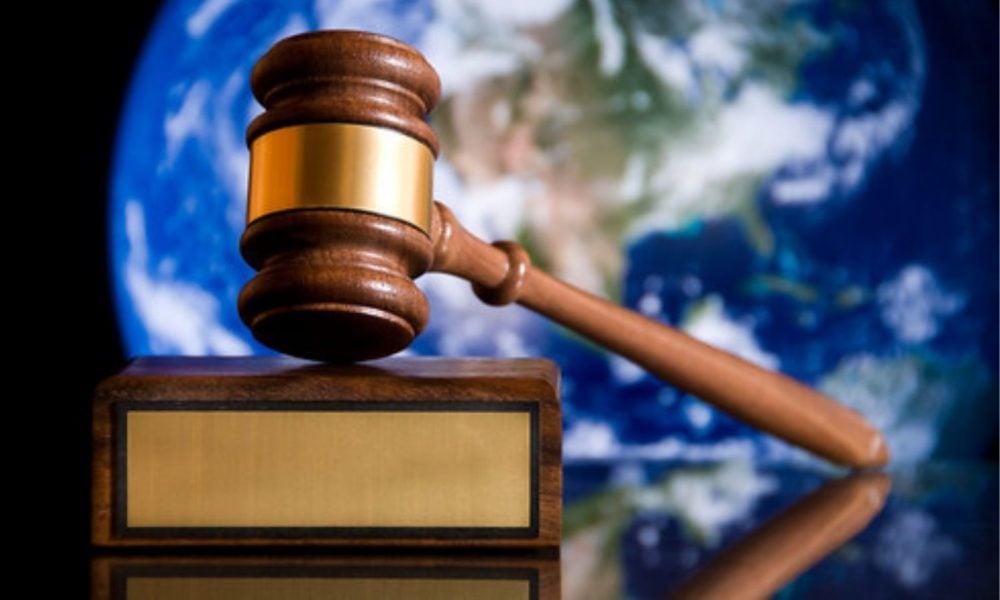A year ago, UCS launched the Science Hub for Climate Litigation, an exciting project that works at the nexus of science and law to help inform climate litigation. Climate litigation—actions in the courts or other legal bodies seeking to address a wide array of topics related to climate change and climate-aligned policy—has grown in importance as a tactic for curtailing or addressing impacts from climate change. We have seen a renewed hope for climate action from the courts, and potential for meaningful change. There is an important opportunity right now for science to inform the law to better address climate change. If we want robust and meaningful science to reach the courts, we need to start thinking about how science and the law operate together.
I joined UCS specifically to conduct and communicate legally relevant research. Here are a few lessons I’ve learned over the last year.
1. The courts are an increasingly important venue for addressing climate change
For decades we have been looking to governments and policymakers to properly address the realities of climate change. Recent analysis by the IPCC shows that current policy efforts will likely fail to prevent global warming of 1.5 degrees Celsius relative to 1850-1900. The legislature, however, isn’t the only branch of government with the power to create change. The courts have become a critical venue for addressing climate change.
Between 2015 and 2021, more than 1,000 climate change-related cases were filed across the globe, and I don’t see an end in sight for new, strategic climate litigation. Litigation has the potential to be an important tool in our work to address the impacts of, and prevent further damage from, climate change. The May 2021 ruling in the Netherlands that Royal Dutch Shell must reduce its emissions shows the important role that courts can play in climate action. Litigation, however, is only useful if it is informed by robust and meaningful research. Science has a clear place in climate litigation and the scientific community has an important role to play. In graduate school I was never taught to think about the courts as an audience for my research, but times are changing.
2. For science to effectively inform the courts, scientists need to engage with the legal community
Science is not the absolute that legal practitioners often want it to be, and translating scientific findings with precision and accuracy for the courts can be incredibly difficult. The precision required for robust science and the precision necessary to convey ideas in a courtroom are not always the same. This is not a failure of either system, but just as scientists have learned to communicate across academic disciplines to produce meaningful interdisciplinary work, scientists can also learn how to communicate with lawyers, judges, and juries.
Climate litigation truly exists at the nexus of science and the law; neither lawyers nor scientists can produce strategic climate litigation in isolation. A study published in Nature Climate Change found that plaintiffs aren’t using the best available scientific evidence in climate change litigation. This may point to a lack of engagement between these two communities.
Scientists and lawyers are trained to approach evidence in different ways. As an interdisciplinary scientist, I thought I was trained to work with any expert. My PhD program intentionally pulled together researchers from diverse backgrounds to tackle tough questions. None of this training truly prepared me for working with lawyers. But these skills can be learned.
By working together, scientists and the legal community can help to ensure that robust and meaningful research is being communicated well for the courts. This will require trainings, seminars, and more shared spaces between science and the law.
3. The courts are a great venue for socially relevant research
As a young scholar interested in applied research, I was advised that my work should always seek broader impacts than just informing the academy. Most commonly this meant looking for policy-relevant outcomes for research. Over the last few decades, the academy has embraced policy-relevant work. After all, why wouldn’t we want our policies informed by robust and timely science? The courts operate alongside policymakers in shaping large-scale outcomes for society. I argue that having your research inform the courts is just as valuable.
Scientists can start to think about application of their research in the courts as a potential outcome early on. We can look at trends in litigation to anticipate and address critical science-based questions that courts will likely raise. We can think more broadly about the audience of our research. When drafting language, don’t just think about how other academics or a policymaker might understand something, but also picture a judge and jury as your audience.
4. Scientists belong in the courts
During my PhD I worked in southern West Virginia. I came to this new home with a deep background in hydrology and an understanding of critical social science research methods. After months living in my new community, it quickly became clear that my future PhD work would include research on coal mining, floods, and our changing climate—and ultimately it would land me on the stand as an expert witness.
There are many ways to engage in climate litigation. As scientists we can produce litigation-relevant research, consult on cases to provide technical guidance or review materials, contribute to an amicus curiae, or “friend of the court,” brief to help inform the court, and/or serve as an expert witness. UCS research has been cited in over 70 percent of climate damages and fraud cases filed to date, and we’ve worked on amicus briefs for communities across the U.S. Robust research and engaged scientists in the courts can really make a difference.
As climate cases continue through the courts there will be an increasing demand for scientists to serve as expert witnesses. No one bats an eye at the idea of a forensic expert or psychologist taking the witness stand, but many scientists that I talk to in the academy question their role in the courts. Just as we need robust research to inform litigation, we need scientists who are skilled at explaining their research to the courts.
It isn’t easy to serve as an expert witness, but there are resources to help scientists be successful in the courts. While I like to think that my oral defense prepared me for any scrutiny, the courtroom is a unique space. The scientific community needs to prepare itself for an increased role in the courts as climate litigation becomes more prevalent.
Who can do this work? We need all experts to engage. The courts need to hear from climate scientists, historians, economists, and biologists, among other disciplines.
Climate litigation, informed by science, may help those affected by climate change take action against responsible parties to limit climate harms. When I joined UCS, I was quickly thrust into a new, interdisciplinary space at the nexus of science and climate litigation. Entering my PhD program, I never would have dreamt that I’d be spending my days trying to understand legalese, but as someone motivated by strategic and meaningful change, now there is no space where I’d rather be working.
Check out the Science Hub for Climate Litigation to dig deeper into the nexus of science and litigation.

